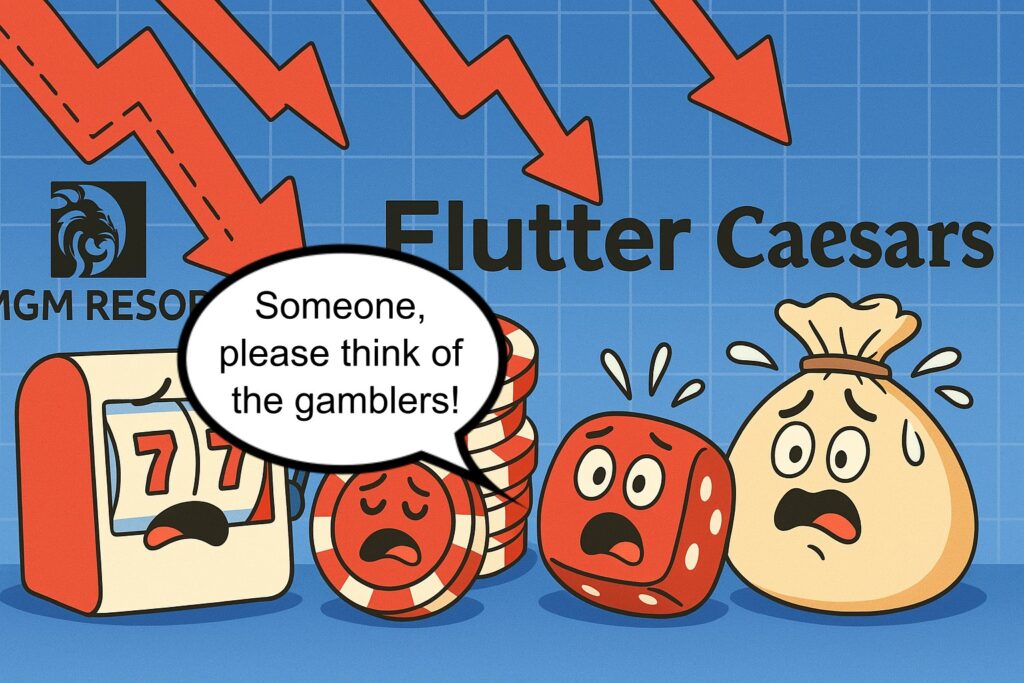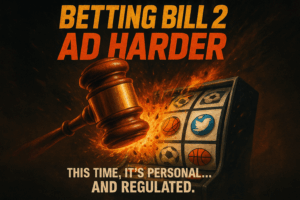In this week’s edition of the GME3, we’re taking a look at the financial impact that new U.S. tariffs are having on the gambling sector, controversy surrounding AI technology that’s potentially being used to enhance government surveillance efforts, and another 75-day extension on the TikTok ban due to tariffs. Read the full stories below!
Gambling
Tariff-ic Losses
The recent announcement of sweeping new US tariffs by President Donald Trump has triggered a global market sell-off, and the gambling sector has been hit particularly hard. Over the past week, major casino and gambling stocks have suffered significant losses, reflecting both immediate investor panic and deeper concerns about long-term economic consequences.
UK-based gambling firms were among the hardest hit, with Evoke plc (formerly 888 Holdings Ltd.) tumbling 20.15%, Entain down 16.04%, and Better Collective losing 15.39%. In the US, Wynn Resorts fell 13.50%, PENN Entertainment dropped 13.34%, and Las Vegas Sands and MGM Resorts lost 11.01% and 9.59%, respectively. Online-focused operators like DraftKings and Caesars fared slightly better but still saw declines. Asian gaming giants Sands China and Galaxy Entertainment weren’t spared either, dropping over 17% and 16% respectively.
Analysts warn this could be more than a temporary dip. According to Regulus Partners, the tariffs could mark the most significant structural shift in the global economy since 1990. Rising costs may curb US consumer spending on leisure – gambling included – especially if wages stagnate and living costs soar. This could reduce demand for land-based casinos, while potentially accelerating the shift to online gambling, particularly as states look to replace shrinking tax bases.
However, the global picture is complex. In export-reliant emerging markets, especially in Asia and South America, tariffs could spark economic instability, undermining the very gambling markets some governments may rely on for recovery. In short, the ripple effects of these tariffs could leave the global gambling industry navigating unpredictable and dangerous waters. And, while the majority of tariffs have now been paused for 90 days, nobody can say for sure if, or when, they’ll come back into effect.
Media
Followed by Big Brother
As the Trump administration continues its efforts to crack down on immigration, ostensibly for national security purposes, social media has become a key focus in surveillance practices. The Department of Homeland Security (DHS) has cited online posts in cases against individuals, including Palestinian activist Mahmoud Khalil and Georgetown researcher Badar Khan Suri. Yet the methods used to collect and analyze these posts remain unclear, as DHS has not disclosed details.
Public records reveal four active DHS contracts with companies specializing in social media monitoring, all of which promote the use of artificial intelligence. These include multimillion-dollar deals with firms like Fivecast, Penlink, Cobwebs Technologies, and Whooster. Their tools claim to sift through massive amounts of content, offering features such as emotion analysis and AI-powered chatbots to interpret data.
While AI offers efficiency and scale, experts warn it can also introduce significant risks. Unlike earlier tools that merely searched content, newer AI systems may make judgments about users’ intentions or connections, raising concerns about due process and civil liberties. Critics argue that AI could automate surveillance decisions without proper human oversight, leading to false arrests or misuse of data due to “automation bias” – a misplaced trust in machine-generated conclusions.
Despite these dangers, AI continues to be integrated into government surveillance, prompting lawmakers and civil rights advocates to call for stronger oversight and accountability. As one expert put it, AI may lend an air of certainty to inherently uncertain conclusions, amplifying the stakes of getting it wrong.
Entertainment
App-ocalypse Later
TikTok has been granted another reprieve, extending the deadline for the app to separate from its China-based parent company, ByteDance, by 75 days. This marks the latest delay in enforcing a federal law that bans TikTok in the U.S. unless it is divested from Chinese ownership, citing national security concerns.
Although a deal had been expected on Friday, it was stalled by Chinese regulators, reportedly in response to the newly announced tariffs on Chinese imports. Sources close to the negotiations say Beijing is using the TikTok agreement as leverage to seek tariff relief. Additionally, the firing of a National Security Council official involved in coordinating the deal further complicated progress.
Trump acknowledged the holdup on Truth Social, saying the agreement needs more time to be finalized and indicating a desire to work “in good faith” with China, despite ongoing trade tensions. Meanwhile, ByteDance confirmed negotiations are continuing but noted that final approval must come from Chinese authorities.
Despite the federal ban, passed with broad bipartisan support and upheld by the Supreme Court, TikTok remains online, thanks to executive orders delaying enforcement and shielding tech providers like Apple and Google from legal risk. Legal experts argue these delays may violate the law, since they require certification that a divestiture is underway – something that has not been confirmed.
The software company Oracle is once again a leading candidate to take a stake in TikTok’s U.S. operations. However, as in the past, the biggest obstacle remains China’s sign-off, which sources suggest may depend on concessions in the ongoing trade battle.
GME Law is Jack Tadman, Zack Pearlstein, Lindsay Anderson, Daniel Trujillo, and Will Sarwer-Foner Androsoff. Jack’s practice has focused exclusively on gaming law since he was an articling student in 2010, acting for the usual players in the gaming and quasi-gaming space. Zack joined Jack in September 2022. In addition to collaborating with Jack, and with a keen interest in privacy law, Zack brings a practice focused on issues unique to social media, influencer marketing, and video gaming. Lindsay is the most recent addition to the team, bringing her experience as a negotiator and contracts attorney, specializing in commercial technology, SaaS services, and data privacy.
At our firm, we are enthusiastic about aiding players in the gaming space, including sports leagues, media companies, advertisers, and more. Our specialized knowledge in these industries allows us to provide tailored solutions to our clients’ unique legal needs. Reach out to us HERE or contact Jack directly at jack@gmelawyers.com if you want to learn more!
Check out some of our previous editions of the GME3 HERE and HERE, and be sure to follow us on LinkedIn to be notified of new posts, keep up to date with industry news, and more!




